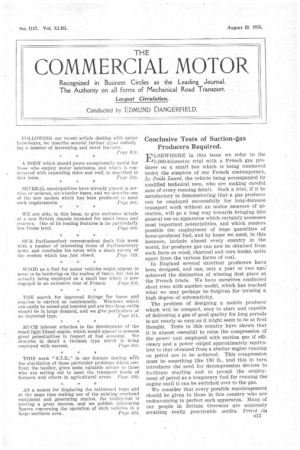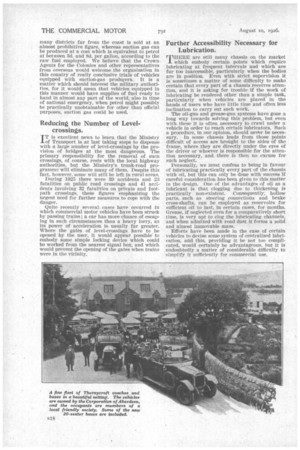Conclusive Tests of Suction-gas Producers Required.
Page 1

Page 2

If you've noticed an error in this article please click here to report it so we can fix it.
LSE WHERE in this issue we refer to the 5,000-kilometre trial with a French gas producer on a small bus which is' being Conducted under the auspices of our French contemporary, Le Poids ,Lord, the vehicle being accompanied by qualified technical men, who are making careful note of every running detail. Such a trial, if it be satisfactory in demonstrating that a gas producer can be employed successfully for long-distance transport work without an undue measure of attention, will go a long way towards bringing into general use an apparatus which certainly possesses most important potentialities, and which renders possible the employment of huge quantities of home-produced fuel, and by home we must, in this instance, include almost every country in the world, for producer gas can now be obtained from such fuels as wood, charcoal and corn husks, quite apart from the various forms of coal.
In England several excellent producers have been designed, and one, only a year or two ago, achieved the distinction of winning first place at the French trials. We have ourselves conducted short tests with another model, which has reached what we may perhaps be forgiven for' terming a high degree of automaticity.
The problem of designing a mobile producer which will be compact, easy to start and capable of delivering a gas of good quality for long periods is not nearly so easy,as it might seem to he at first thought. Tests in this country have shown that it is almost essential to raise the compression of the power unit employed with suction gas if efficiency and a power output approximately equivalent to that obtained from a similar engine running on petrol are to be achieved. This compression must be something like 130 lb., 'and this in turn introduces the need for decompression devices to facilitate starting and to permit the employment of petrol as a temporary fuel for running the engine until it can be switched over to the gas.
We consider that every possible encodragement should be given to those in this country who are endeavouring to perfect such apparatus. Many of our people in Britain Overseas are anxiously awaiting really practicable outfits. Petrol in
many districts far from the coast is sold at an -almost prohibitive figure, whereas suction gas can be produced at a cost which is equivalent to petrol at between 3d. and 8d. per gallon, according to the raw fuel employed. We believe that the Crown. Agents for the Colonies and other representatives from overseas would welcome the organization in this country of really conclusive trials of vehicles equipped with suction-gas producers. It is a matter which should interest the military authorities, for it would mean that vehicles equipped in this manner would have supplies of fuel ready to hand in almost any part of the world, also in time of national emergency, when petrol might possibly be practically unobtainable for other than official purposes, suction gas "could be used.
Reducing the Number of Levelcrossings.
IT is excellent news to learn, that the Ministry of Transport is at last taking steps to dispense with a large number of level-crossings by the provision, of bridges at the most dangerous. The primary responsibility for the removal of sucn crossings, of course, rests with the local highway authorities, but the Ministry's trunk-road programme will eliminate many of them. Despite this fact, however, some will still be left in rural areas.
During 1945 there were 39 accidents and 23 fatalities on public road crossings and 41 ace-dents involving 32 fatalities on private and footpath crossings, these figures emphasizing the urgent need for further measures to cope with the danger.
Quite recently several cases have occurred in Which commercial motor vehicles have been struck by passing trains ; a car has more chance of escaping in such circumstances than a heavy lorry, as its power of acceleration is usually far greater. Where the gates of level-crossings have to be opened by the user, it would appear possible' to embody some simple .locking device which could be worked from the nearest signal box, and which would prevent the opening of the gates when trains were in the vicinity.
Further Accessibility Necessary for Lubrication.
rTIHEnE are still many chassis on the market -L which embody certain points which require lubricating at frequent intervals and which are far too inaccessible, particularly when the bodies are in position. Even with strict supervision it Is sometimes a matter of some difficulty to make certain that every part of a chassis receives attention, and it is asking for trouble if the work of lubricating be rendered other than a simple task, particularly when vehicles are placed in the hands of users who have little time and often less inclination to carry out such work.
The oil-gun and grease-gun systems have gone a long way towards solving this problem, but even. with these it is often necessary to crawl under a vehicle in order to reach certain lubricators. Such a procedure, in our opinion, should never be necessary. In some chassis leads from those points difficult of access are brought to the sides of the frame, where _they are directly under the eyes of the driver or whoever is responsible for the attention necessary, and there is then no excuse for such neglect.
Personally, we must confess to being in favour of lubricating practically every part of the chassis with oil, but this can only be done with success if careful consideration has been given to.this matter in the. design. One of the advantages of oil as a lubricant is that clogging due to thickening is practically non-existent. Consequently, hollow parts, such as steering connections and brake cross-shafts, can be employed as reservoirs for sufficient oil to last, in certain cases, for months. Grease, if neglected even for a comparatively short time, is very apt to clog the lubricating channels, and when admixed with road dust it forms a solid and almost immovable mass.
Efforts have been made in the case of certain vehicles to devise some system of centralized lubrication, afid this, providing it be not too complicated, would certainly be advantageous, but it is undoubtedly a matter of considerable difficulty to simplify it sufficiently for commercial use.




























